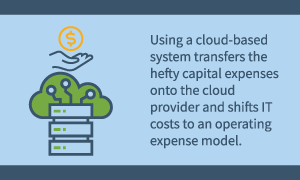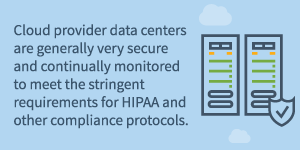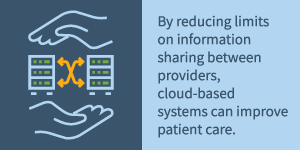Adopting an electronic health records system was, in large part, designed to improve provider workflows and improve patient experience through enhanced standards of care. Yet many healthcare organizations struggle to achieve the desired outcome with their current EHR system. For some, the primary issue is not the EHR platform itself, but rather where and how the medical records themselves are stored.
With the new reality of healthcare delivery relying on multiple clinical settings under a single corporate entity, interoperability is more important than ever. And as costs rise and reimbursements stagnate, streamlining technology costs is a constant challenge.
Choosing where your data will be stored can make all the difference in patient outcomes, provider satisfaction, and achieving interoperability.
If you’re in the market for a new EHR system — or simply looking to make your current system more efficient — consider these 3 reasons to take your EHR to the cloud.
What Are the Cost Advantages of a Cloud-Based EHR System?
 One of the biggest financial drains on a healthcare system that plans to update or optimize their current EHR system is the cost. With in-house systems you can be looking at millions of dollars’ worth of capital investment for a larger organization. Then, there is the on-going maintenance, upkeep, and support required to keep your records system compliant and secure.
One of the biggest financial drains on a healthcare system that plans to update or optimize their current EHR system is the cost. With in-house systems you can be looking at millions of dollars’ worth of capital investment for a larger organization. Then, there is the on-going maintenance, upkeep, and support required to keep your records system compliant and secure.
Using a cloud-based system transfers the hefty capital expenses onto the cloud provider and shifts IT costs to an operating expense model.
Smaller, rural or community hospitals benefit from cloud-based solutions because the cost of implementing and maintaining a cloud-based system is built into the agreement with the cloud provider.
Smaller practices will find a cloud based EHR a cost-effective solution because typically these clinics lack the ability to hire the needed IT support to increase provider satisfaction with EHR platforms.
For both large and small organizations, adopting a cloud hosted solution can reduce costs, increase security, and achieve more efficient levels of communication with both colleagues and consumers.
Are Cloud-based EHR Systems Secure and Compliant?
Typically, most cloud based EHR solutions are more secure than their in-house counterparts. Because medical records typically contain not only sensitive medical histories but also primary identification factors like dates of birth, social security numbers, family names, and patient addresses, data security is critical.
 Organizations can discuss very specific needs with a cloud provider who can in turn help to develop and support security protocols that secure patient data while leaving it accessible only to the employees and providers who need it to perform job functions or administer direct patient care.
Organizations can discuss very specific needs with a cloud provider who can in turn help to develop and support security protocols that secure patient data while leaving it accessible only to the employees and providers who need it to perform job functions or administer direct patient care.
Cloud provider data centers are generally very secure and continually monitored to meet the stringent requirements for HIPAA and other compliance protocols. And these data centers are maintained and monitored by well-trained staff who continually test and harden their networks and servers against breaches and other cyberattacks.
With a cloud partner, you have the peace of mind knowing that your system is secure, and that patches and updates are performed to minimize risk and downtime.
Can We Achieve Interoperability with a Cloud-Based EHR System?
Relying on an in-house model significantly limits a healthcare organization’s ability to achieve interoperability. The sooner hospitals, clinics, and associated practices migrate EHR into a cloud-based system, the sooner a safe exchange of health information can occur.
 When providers can share critical care data points with colleagues inside an organization, patient outcomes improve, and readmission rates can potentially be reduced. When providers are confident they have all the information on a patient available to them, their ability to optimize decision making is improved. By reducing limits on information sharing between providers, cloud-based systems can improve patient care.
When providers can share critical care data points with colleagues inside an organization, patient outcomes improve, and readmission rates can potentially be reduced. When providers are confident they have all the information on a patient available to them, their ability to optimize decision making is improved. By reducing limits on information sharing between providers, cloud-based systems can improve patient care.
Interoperability will always be a moving target, but if your organization is considering upgrading or optimizing your current EHR hosting situation, the improved data exchange afforded by a cloud-based or cloud hosted patient records system should be a key consideration of your implementation team.
The Benefits of Cloud Based EHR
As the demands of modern healthcare practice keep changing, the most agile organization will be the one using a cloud hosted EHR solution.
Reducing the overall total cost of ownership of the system by transferring the cost of maintaining the infrastructure to a trusted cloud provider, healthcare organizations can effectively improve key budget metrics.
Having a cloud-based or hosted system also allows for increased data security within a regulated network that meets or exceeds current industry compliance standards. This also reduces the IT staffing requirements to maintain the system and support the individual end users.
And, for larger more complex healthcare systems with satellite care centers and affiliated practices, a cloud-based system allows for a secure data exchange that leads to improved patient outcomes and provider confidence in the EHR system.
If you’re ready to consider making the transition to a cloud hosted EHR system, we’d like to talk to you about how we can help you meet your goals and how to position you to best utilize cloud resources to achieve cross organizational KPIs from budget and back office to frontline patient care.

